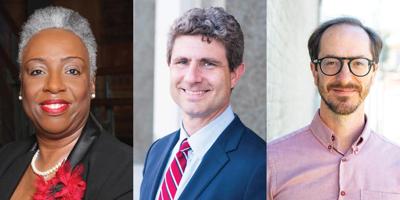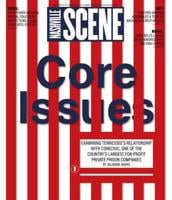Typically mayors run for reelection and win. Nashville had just six over a span of 50 years, an era of stability that ended when Karl Dean left office in 2015 amid the city’s ascendant national profile. Since then, a rotating cast of leaders has tried to steer the city through a historic population boom, skyrocketing home prices, standstill traffic, shuttered meat-and-threes, vindictive state lawmakers and the hot-tub-toting tractors for which the city is now known, all failing to unite civic leaders and disgruntled residents who agree only that Nashville is on the wrong track.
With the surprise announcement last week that he would not seek a second term, Mayor John Cooper guaranteed that yet another candidate will have a shot as the city’s chief executive. Elections this summer will be the city’s third changing of the guard since Megan Barry resigned in March 2018 amid scandal surrounding an affair with her bodyguard. Cooper cruised to victory over David Briley in 2019 promising sound financial management and a focus on bread-and-butter issues like schools, sidewalks and government efficiency. As its most visible leader, he became its most popular punching bag as Nashville’s structural problems — traffic, potholes, insufficient transportation infrastructure, understaffed and underfunded Metro departments, an inadequate and prohibitively expensive housing supply — got worse. Amplifying effects of the COVID pandemic and various other term-defining obstacles, like the downtown Christmas Day bombing in 2020 and the Titans’ billion-dollar bill coming due after three decades, did not help.
While he avoided any real scandals and kept the city functional — an overdue tax increase in 2021 made him few friends but sidestepped crisis — many onetime supporters soured on him personally, eroding a once-reliable base of support from across Metro and in downtown business circles. A revolving door inside his administration (and the gossip that escaped) earned him a reputation as a micromanager, quick to anger and quick to infantilize. Dealmaking with Cooper often upended projected timetables even as his office harried councilmembers for their stamps of approval.
While sources close to Cooper assure us he would have won reelection easily, they also admit that he didn’t want to win — at least not enough to write the checks necessary to float a million-dollar campaign or to defy the wishes of his wife Laura, whose reticence apparently weighed heavily on his decision to hang up his loafers and return to Woodlawn Drive.
He leaves the field wide open. Metro has been buzzing with gossip since Cooper bowed out, and a long list of potentials now appends three original challengers: District 19 Councilmember Freddie O’Connell, Councilmember At-Large Sharon Hurt and former Metro executive Matt Wiltshire. Big money has lined up behind Wiltshire, whose year-end financial disclosures show $1 million on hand for the campaign. Wiltshire’s boosters include Old Nashville powerbroker Aubrey Harwell, development titan Bert Mathews, Max and Ben Goldberg of Strategic Hospitality, a handful of Frists, and a cast of Metro veterans like Rich Riebeling and Kevin Crumbo. Cooper drew support from a similar West Side crowd, leaving Wiltshire to grow his moneyed and influential base. Bruce Dobie’s Power Poll sampled the same demographic in the hours following Cooper’s press conference; it returned overwhelming support for Wiltshire along with a slight nod toward potential candidate Bob Freeman, a state representative with the wealth and name recognition to jump in quickly, who has expressed interest. (Disclosure: Freeman’s father Bill Freeman owns FW Publishing, the Scene’s parent company.)
O’Connell reported $263,000 on hand, enough to sustain a formidable campaign through August. A tireless campaigner who keeps his schedule full, O’Connell has built a reputation as a pragmatic lawmaker with a sophisticated understanding of Metro’s sprawling bureaucracy in his eight years as a Salemtown councilmember. Hurt began fundraising in December and has reported raising $5,200, but she can count on strong support from North Nashville, her political home. (Her literal home is currently in Bellevue.) Sources close to the mayor say Hurt’s candidacy, more than Wiltshire’s or O’Connell’s, made Cooper pause and recalculate his path to reelection. Retired AllianceBernstein executive Jim Gingrich stands on the sidelines, along with the staff he has reportedly hired.
Metro property assessor and former two-term Councilmember Vivian Wilhoite announced she was exploring candidacy in the hours (if not minutes) after Cooper’s announcement. Councilmember At-Large Bob Mendes has shown interest, and former Mayor Megan Barry has been making calls — her 2018 charges have been expunged and don’t bar her from a political comeback. Short lists over the past week also include Charles Robert Bone and state Sens. Heidi Campbell and Jeff Yarbro — really anyone who’s had their name on a yard sign in the past decade. With a few phone calls, longtime U.S. Rep. Jim Cooper, newly unemployed, could quickly become a favorite and potentially keep the mayor’s office in the family.
The city’s next mayor has the unenviable task of stemming the crises of transportation, housing, state relations and affordability that continue to crash down on the city without an effective coordinated response. Candidates have six months to convince voters they can get Nashville back on any kind of track.
Update, Feb. 7: Speaking with the Scene, TJ Ducklo, spokesperson for Mayor Cooper, calls reporting on funding concerns and family pressure “patently false.” He also disputes that the Cooper camp felt any trepidation caused by the Sharon Hurt campaign.





